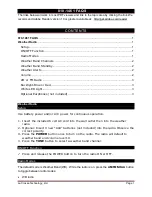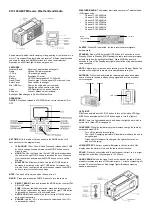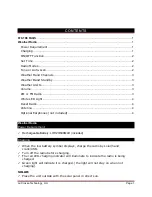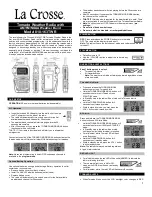
0
English
Batteries
If the sensor is exposed to extreme temperatures for an extended period of time, the range of
transmission of the data may be affected.
Setting up the remote sensors
The remote sensors must be fixed on a smooth surface to ensure that there are no interferences
in the data transmission range. The sensor and main unit must not be set up on or near a large
metallic surface. Before setting up the sensor at a chosen location, ensure that the main unit
receives the signals from this site. It is also recommended that the sensor be placed as close to
the main unit as possible in order to avoid any interferences.
Weather Forecast
We cannot guarantee absolute precision with regards the weather forecast. The weather forecast
function has a 75% precision rate due to it being created to suit a variety of environments.
IMPORTANT NOTICE
Problem:
1. The main unit cannot receive radio control DCF-77 or MSF signals to update the clock.
. Temperature reading of outdoor remote sensor seems too high.
3. Receiver is no longer receiving remote sensor signals or display.
. An abnormal operation has been observed and certain functions do not work.
Solution:
1. Place the clock away from metal objects or electrical appliances such as TVs, computers,
monitors, etc. Trigger the scan manually by holding the MIN- key for 3 seconds.
. Wait a few minutes to ensure the remote sensor and receiver are in phase. Otherwise,
re-synchronize receiver by holding the CHANNEL key for 3 seconds until a beep is heard.
3. Ensure the remote sensor is out of direct sunlight, and away from sources of heat.
TROUBLESHOOTING
















































